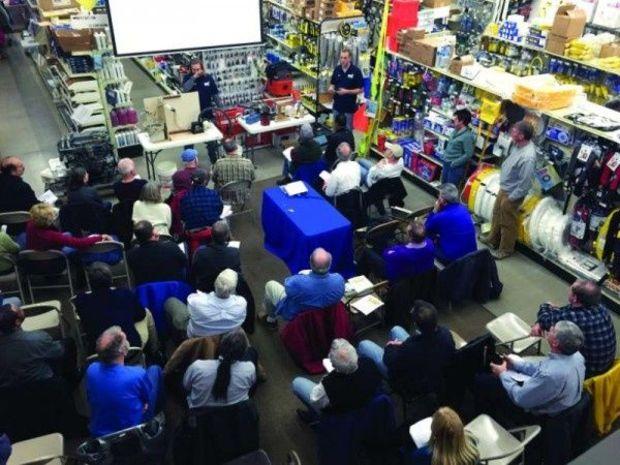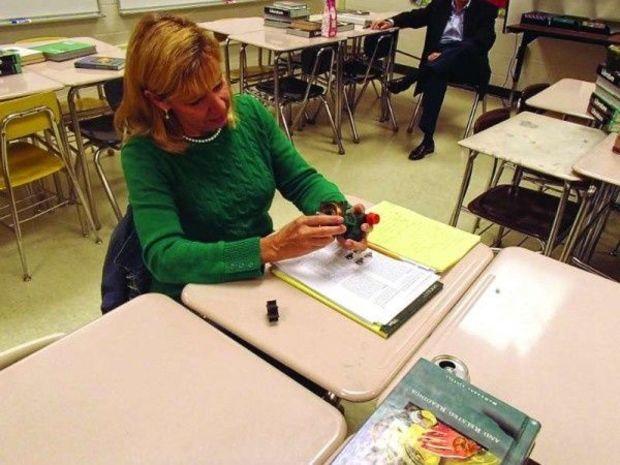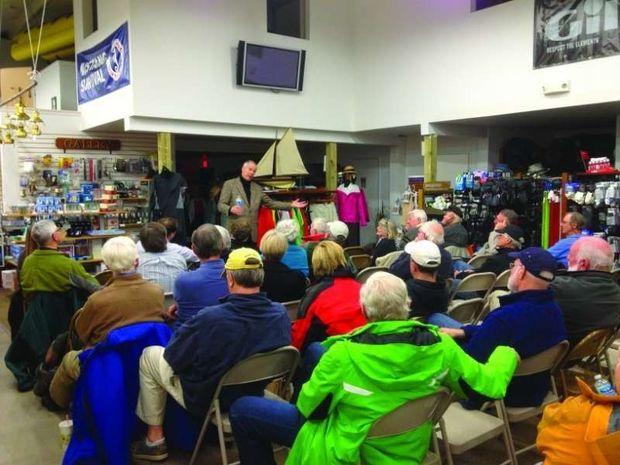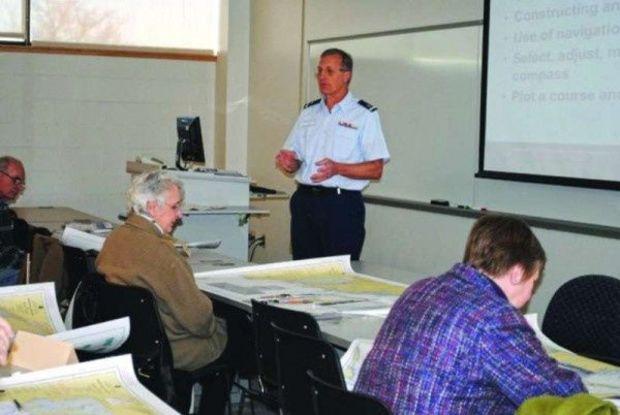Okay, your boat is on the hard for the winter. It’s too cold to do anything outdoors, and you’re climbing the walls wishing that they were bulkheads. What’s the best way to keep connected to boating when you can’t actually get underway until spring?

Enroll in a course given by a maritime school, a public-service organization, or a marine supply store. It may not provide the same thrill that leaving your dock does in warmer months, but it will add to your nautical knowledge, provide tips you can use on the water, and make you a better boater—which means you’ll enjoy boating even more once you get back to it in the spring.
You won’t be alone. Hundreds of sailors and powerboaters take advantage of the off-season months to sharpen their boating skills, meet other boaters, and broaden their nautical horizons. It’s a good time to meet Maryland’s law requiring every boater born after July 1, 1972 to take a basic boating safety course. Taking some courses may earn you a discount on boat insurance.
Annapolis boaters John and Kathy Nash did that. Following standard practice, the two took their first class “way back” when their only boat was a canoe, passing a basic boating course that winter. Then came more advanced courses in piloting, navigation, and diesel maintenance, and day-long seminars in anchoring and other topics.

This winter Kathy is spending one evening a week (plus homework) in an Annapolis Sail and Power Squadron course on engine maintenance, which she hopes will give her a better grasp of what needs to be done to help keep their boat in good shape. “It’s one of the best courses I’ve taken,” she says. “I really didn’t know what I was looking at before.”
Boaters Diane and Grant Woodside, also fans of winter course-taking, recommend that couples enroll in such courses together, so that each person can gain enough skills to do all the tasks required on the boat rather than leaving some tasks entirely to one partner. They say doing homework is more enjoyable when they can help each other learn the material.
There’s a wide array of opportunities for winter boating courses. Classes range from state-required boating safety courses to basic seamanship, boathandling, navigation and piloting, weather, first aid and CPR, handling emergencies underway, marine engines, marine electrical systems, cruising, and preparing for a captain’s license exam.
And there are specialty courses in how to sail, use your chartplotter and global positioning system (GPS) receiver, operate a VHF-FM marine radio, and how to train your crew properly to get help and take over if you should be injured.
 State-required boating safety courses:
State-required boating safety courses: Maryland and Virginia departments of natural resources; United States Power Squadrons (USPS; and U.S. Coast Guard (USCG) Auxiliary. Find your local unit (some send Club Notes to PropTalk). The cost is minimal and depends on who is conducting the class. Not all boaters are required to take the course, but you should have it under your belt anyway.
Maritime schools: Institutions such as the Annapolis School of Seamanship offer a full range of courses, with high-quality instructors. The Maryland School of Sailing and Seamanship and several other sailing schools offer some specialized winter courses for sailors as well as powerboaters.
Public-service organizations: Both the USPS and the USCG Auxiliary offer courses and seminars (one-day and half-day classes) in a variety of subjects at relatively low cost. So does the Chesapeake Area Professional Captains Association (CAPCA).
Marine supply stores: Stores such as Fawcett Boat Supplies and West Marine maintain a winter schedule of weekday evening (or Saturday morning) classes on a wide variety of boating-related topics—all of them free of charge and listed in the PropTalk calendar (page 23). You don’t get a certificate for attending, but the speaker usually is an expert on that day’s topic, and you can get your questions answered.
Online: Several organizations offer webinars (online classes conducted via live videoconferences) on boating-related topics. Depending on the course, students can email or message their questions or ask the instructor questions over the telephone, which can be heard by other students.
Both the state boating safety courses and some USPS courses are available online—in some cases, with an exam overseen by a proctor. And Mariner’s Learning System and USCaptain’s Training offer online courses in preparation for captain’s licensing and renewal, with provisions for students to ask questions via electronic message.
Some boaters argue that in-person classes offer more because students can learn a lot from hearing their classmates’ questions and can relate some of the problems they’ve encountered while underway. Choose whichever method suits your schedule and the way you learn best.
The important thing is to use the winter months to gain the knowledge and skills that will help you in the spring and summer. “Then, the most important thing to do is, in the spring, practice what you learned,” Grant Woodside says.
For a more complete list of winter course offerings, check out the
PropTalk calendar.
 Do I really have to take the state boating safety course?
Do I really have to take the state boating safety course?
That’s a question you hear a lot, especially among new boaters. Too many of them think taking a boating safety course is unnecessary, and are willing to bet they’ll never get caught. Others look for loopholes that exempt them from state requirements.
The legalities vary widely from state to state. In Maryland, anyone born on or after July 1, 1972, must have a state boating education certificate in order to operate a boat legally. Virginia’s requirements depend on your age and the kind of vessel you have. In the District of Columbia, every boat operator must have a certificate.
But the real answer is: you should take the course even if the laws in your state or jurisdiction say you don’t have to. You wouldn’t want to see someone driving a car who hadn’t passed a driver’s license test. You expect drivers to know the traffic rules, be able to read and understand traffic signs, and know how to operate a vehicle properly.
As we all know, not every boater can meet that sort of standard on the water. You can look up the rules on your own at boat-ed.com. And you have a choice: Pass the test online or take the course in a classroom. Winter is a good time to get that under your belt.
About the Author: Art Pine is a USCG-licensed captain and a longtime Chesapeake Bay powerboater and sailor.
 Enroll in a course given by a maritime school, a public-service organization, or a marine supply store. It may not provide the same thrill that leaving your dock does in warmer months, but it will add to your nautical knowledge, provide tips you can use on the water, and make you a better boater—which means you’ll enjoy boating even more once you get back to it in the spring.
You won’t be alone. Hundreds of sailors and powerboaters take advantage of the off-season months to sharpen their boating skills, meet other boaters, and broaden their nautical horizons. It’s a good time to meet Maryland’s law requiring every boater born after July 1, 1972 to take a basic boating safety course. Taking some courses may earn you a discount on boat insurance.
Annapolis boaters John and Kathy Nash did that. Following standard practice, the two took their first class “way back” when their only boat was a canoe, passing a basic boating course that winter. Then came more advanced courses in piloting, navigation, and diesel maintenance, and day-long seminars in anchoring and other topics.
Enroll in a course given by a maritime school, a public-service organization, or a marine supply store. It may not provide the same thrill that leaving your dock does in warmer months, but it will add to your nautical knowledge, provide tips you can use on the water, and make you a better boater—which means you’ll enjoy boating even more once you get back to it in the spring.
You won’t be alone. Hundreds of sailors and powerboaters take advantage of the off-season months to sharpen their boating skills, meet other boaters, and broaden their nautical horizons. It’s a good time to meet Maryland’s law requiring every boater born after July 1, 1972 to take a basic boating safety course. Taking some courses may earn you a discount on boat insurance.
Annapolis boaters John and Kathy Nash did that. Following standard practice, the two took their first class “way back” when their only boat was a canoe, passing a basic boating course that winter. Then came more advanced courses in piloting, navigation, and diesel maintenance, and day-long seminars in anchoring and other topics.
 This winter Kathy is spending one evening a week (plus homework) in an Annapolis Sail and Power Squadron course on engine maintenance, which she hopes will give her a better grasp of what needs to be done to help keep their boat in good shape. “It’s one of the best courses I’ve taken,” she says. “I really didn’t know what I was looking at before.”
Boaters Diane and Grant Woodside, also fans of winter course-taking, recommend that couples enroll in such courses together, so that each person can gain enough skills to do all the tasks required on the boat rather than leaving some tasks entirely to one partner. They say doing homework is more enjoyable when they can help each other learn the material.
There’s a wide array of opportunities for winter boating courses. Classes range from state-required boating safety courses to basic seamanship, boathandling, navigation and piloting, weather, first aid and CPR, handling emergencies underway, marine engines, marine electrical systems, cruising, and preparing for a captain’s license exam.
And there are specialty courses in how to sail, use your chartplotter and global positioning system (GPS) receiver, operate a VHF-FM marine radio, and how to train your crew properly to get help and take over if you should be injured.
This winter Kathy is spending one evening a week (plus homework) in an Annapolis Sail and Power Squadron course on engine maintenance, which she hopes will give her a better grasp of what needs to be done to help keep their boat in good shape. “It’s one of the best courses I’ve taken,” she says. “I really didn’t know what I was looking at before.”
Boaters Diane and Grant Woodside, also fans of winter course-taking, recommend that couples enroll in such courses together, so that each person can gain enough skills to do all the tasks required on the boat rather than leaving some tasks entirely to one partner. They say doing homework is more enjoyable when they can help each other learn the material.
There’s a wide array of opportunities for winter boating courses. Classes range from state-required boating safety courses to basic seamanship, boathandling, navigation and piloting, weather, first aid and CPR, handling emergencies underway, marine engines, marine electrical systems, cruising, and preparing for a captain’s license exam.
And there are specialty courses in how to sail, use your chartplotter and global positioning system (GPS) receiver, operate a VHF-FM marine radio, and how to train your crew properly to get help and take over if you should be injured.
 State-required boating safety courses: Maryland and Virginia departments of natural resources; United States Power Squadrons (USPS; and U.S. Coast Guard (USCG) Auxiliary. Find your local unit (some send Club Notes to PropTalk). The cost is minimal and depends on who is conducting the class. Not all boaters are required to take the course, but you should have it under your belt anyway.
Maritime schools: Institutions such as the Annapolis School of Seamanship offer a full range of courses, with high-quality instructors. The Maryland School of Sailing and Seamanship and several other sailing schools offer some specialized winter courses for sailors as well as powerboaters.
Public-service organizations: Both the USPS and the USCG Auxiliary offer courses and seminars (one-day and half-day classes) in a variety of subjects at relatively low cost. So does the Chesapeake Area Professional Captains Association (CAPCA).
Marine supply stores: Stores such as Fawcett Boat Supplies and West Marine maintain a winter schedule of weekday evening (or Saturday morning) classes on a wide variety of boating-related topics—all of them free of charge and listed in the PropTalk calendar (page 23). You don’t get a certificate for attending, but the speaker usually is an expert on that day’s topic, and you can get your questions answered.
Online: Several organizations offer webinars (online classes conducted via live videoconferences) on boating-related topics. Depending on the course, students can email or message their questions or ask the instructor questions over the telephone, which can be heard by other students.
Both the state boating safety courses and some USPS courses are available online—in some cases, with an exam overseen by a proctor. And Mariner’s Learning System and USCaptain’s Training offer online courses in preparation for captain’s licensing and renewal, with provisions for students to ask questions via electronic message.
Some boaters argue that in-person classes offer more because students can learn a lot from hearing their classmates’ questions and can relate some of the problems they’ve encountered while underway. Choose whichever method suits your schedule and the way you learn best.
The important thing is to use the winter months to gain the knowledge and skills that will help you in the spring and summer. “Then, the most important thing to do is, in the spring, practice what you learned,” Grant Woodside says.
For a more complete list of winter course offerings, check out the PropTalk calendar.
State-required boating safety courses: Maryland and Virginia departments of natural resources; United States Power Squadrons (USPS; and U.S. Coast Guard (USCG) Auxiliary. Find your local unit (some send Club Notes to PropTalk). The cost is minimal and depends on who is conducting the class. Not all boaters are required to take the course, but you should have it under your belt anyway.
Maritime schools: Institutions such as the Annapolis School of Seamanship offer a full range of courses, with high-quality instructors. The Maryland School of Sailing and Seamanship and several other sailing schools offer some specialized winter courses for sailors as well as powerboaters.
Public-service organizations: Both the USPS and the USCG Auxiliary offer courses and seminars (one-day and half-day classes) in a variety of subjects at relatively low cost. So does the Chesapeake Area Professional Captains Association (CAPCA).
Marine supply stores: Stores such as Fawcett Boat Supplies and West Marine maintain a winter schedule of weekday evening (or Saturday morning) classes on a wide variety of boating-related topics—all of them free of charge and listed in the PropTalk calendar (page 23). You don’t get a certificate for attending, but the speaker usually is an expert on that day’s topic, and you can get your questions answered.
Online: Several organizations offer webinars (online classes conducted via live videoconferences) on boating-related topics. Depending on the course, students can email or message their questions or ask the instructor questions over the telephone, which can be heard by other students.
Both the state boating safety courses and some USPS courses are available online—in some cases, with an exam overseen by a proctor. And Mariner’s Learning System and USCaptain’s Training offer online courses in preparation for captain’s licensing and renewal, with provisions for students to ask questions via electronic message.
Some boaters argue that in-person classes offer more because students can learn a lot from hearing their classmates’ questions and can relate some of the problems they’ve encountered while underway. Choose whichever method suits your schedule and the way you learn best.
The important thing is to use the winter months to gain the knowledge and skills that will help you in the spring and summer. “Then, the most important thing to do is, in the spring, practice what you learned,” Grant Woodside says.
For a more complete list of winter course offerings, check out the PropTalk calendar.
 Do I really have to take the state boating safety course?
That’s a question you hear a lot, especially among new boaters. Too many of them think taking a boating safety course is unnecessary, and are willing to bet they’ll never get caught. Others look for loopholes that exempt them from state requirements.
The legalities vary widely from state to state. In Maryland, anyone born on or after July 1, 1972, must have a state boating education certificate in order to operate a boat legally. Virginia’s requirements depend on your age and the kind of vessel you have. In the District of Columbia, every boat operator must have a certificate.
But the real answer is: you should take the course even if the laws in your state or jurisdiction say you don’t have to. You wouldn’t want to see someone driving a car who hadn’t passed a driver’s license test. You expect drivers to know the traffic rules, be able to read and understand traffic signs, and know how to operate a vehicle properly.
As we all know, not every boater can meet that sort of standard on the water. You can look up the rules on your own at boat-ed.com. And you have a choice: Pass the test online or take the course in a classroom. Winter is a good time to get that under your belt.
About the Author: Art Pine is a USCG-licensed captain and a longtime Chesapeake Bay powerboater and sailor.
Do I really have to take the state boating safety course?
That’s a question you hear a lot, especially among new boaters. Too many of them think taking a boating safety course is unnecessary, and are willing to bet they’ll never get caught. Others look for loopholes that exempt them from state requirements.
The legalities vary widely from state to state. In Maryland, anyone born on or after July 1, 1972, must have a state boating education certificate in order to operate a boat legally. Virginia’s requirements depend on your age and the kind of vessel you have. In the District of Columbia, every boat operator must have a certificate.
But the real answer is: you should take the course even if the laws in your state or jurisdiction say you don’t have to. You wouldn’t want to see someone driving a car who hadn’t passed a driver’s license test. You expect drivers to know the traffic rules, be able to read and understand traffic signs, and know how to operate a vehicle properly.
As we all know, not every boater can meet that sort of standard on the water. You can look up the rules on your own at boat-ed.com. And you have a choice: Pass the test online or take the course in a classroom. Winter is a good time to get that under your belt.
About the Author: Art Pine is a USCG-licensed captain and a longtime Chesapeake Bay powerboater and sailor.